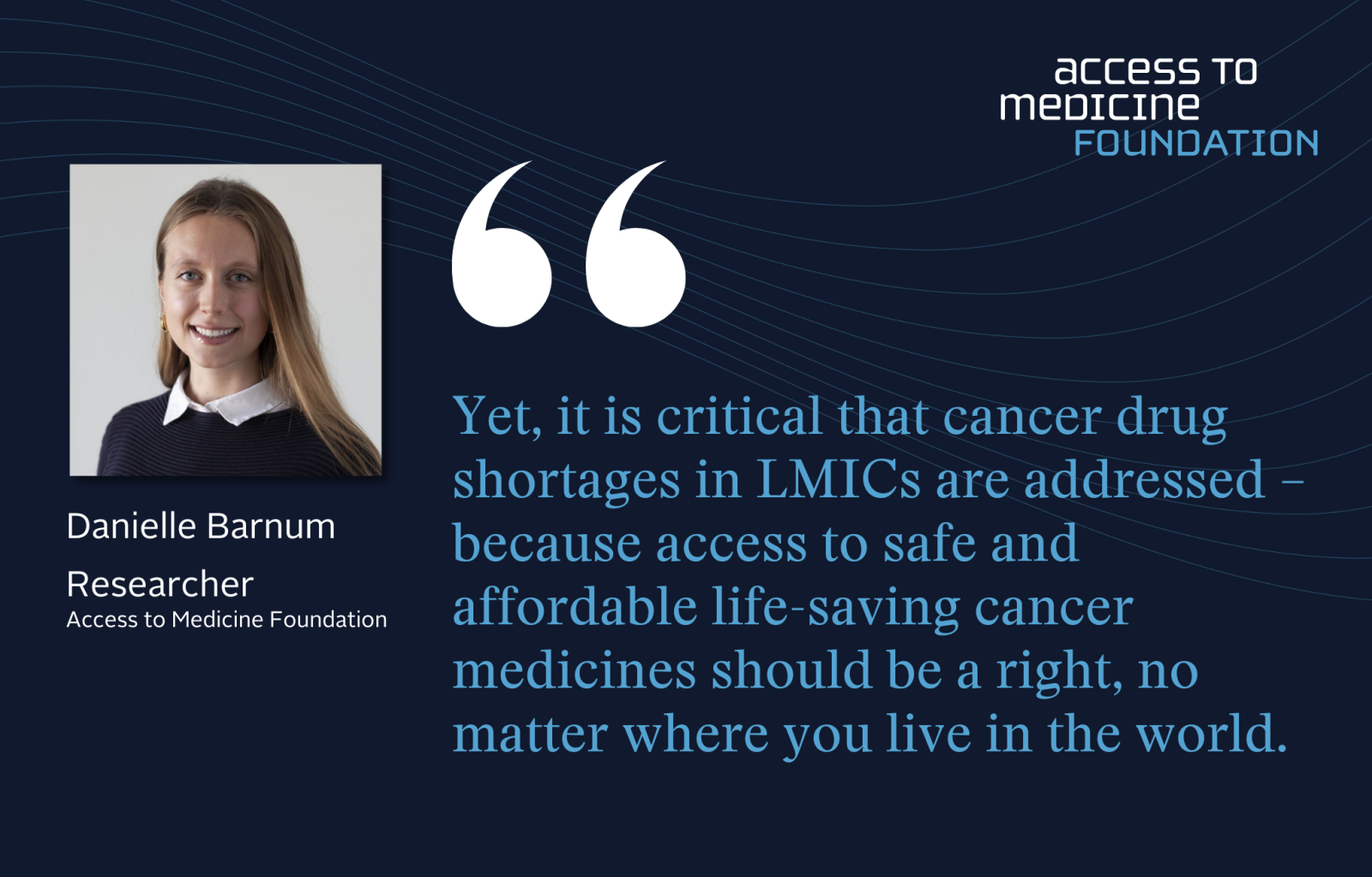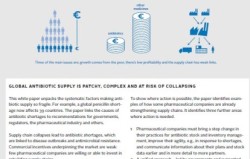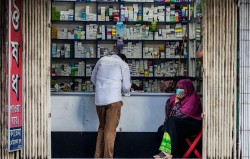In conversations about global chemotherapy drug shortages, low- and middle-income countries cannot be sidelined
Date
06 February 2024

Recent shortages of essential cancer drugs have made the headlines in high-income countries like the USA, where it is estimated that over 90% of hospital systems have experienced shortages of chemotherapy drugs in 2023. But this crisis has been an ongoing reality for cancer patients living in low- and middle-income countries (LMICs) for years - and that is something that cannot be lost in the conversation, especially now that this issue has reached public attention. Patients have raised their voices, calling on the pharmaceutical industry to act upon their responsibility to ensure access globally. It is critical we hear those voices and respond by looking for solutions that will ensure more equitable access to cancer drugs.
In many LMICs, people routinely face chemotherapy drug shortages, which further exacerbates existing health inequalities. In January, hospitals across Kenya faced dire shortages of cancer drugs, including chemotherapy and hormone therapy medications, leaving patients with no option but to skip treatments. This illustrates the fragility of the drug supply chain, where shortages can lead to treatment delays and potentially fatal consequences. This is especially alarming as LMICs bear the brunt of global cancer mortality. Just consider childhood cancers, where there is a staggering 80% mortality in LMICs, compared to a 20% mortality in high-income countries.
Notably, the drugs at the centre of recent shortages have been the comparatively less expensive generic drugs such as cisplatin and carboplatin. These medicines, which have been off patent for decades and can be manufactured as generics, are classified as "essential" by the World Health Organization. These chemotherapy medicines are the backbone of numerous cancer treatment regimens and are vital for patients affected by cancers including ovarian, cervical, lung, bladder and head and neck cancer. For those already undergoing treatment, if these products are unavailable, physicians are forced to use drugs that might be suboptimal or produce side effects – or patients may even go without treatment altogether. For those who are unable to start treatment, this can lead to disease progression due to the time-sensitive nature of cancer care.
There are many challenges that impact the supply of off-patent oncology medicines, such as the narrow profit margins associated with generic drugs, resulting in little commercial incentive for companies in comparison to newer innovative medicines. Governments with high purchasing power exacerbate this issue further by employing tendering processes focused on price. With companies divesting from generics in favour of developing innovative medicines with higher profit margins creates dependencies and a dwindling pool of manufacturers, intensifying drug shortages. For instance, the USA relies on a single supplier for 50% of the cisplatin it procures. When manufacturing at this supplier's plant was suspended due to an FDA inspection for quality and safety concerns, it caused significant disruptions in the supply chain, leaving patients without access to these lifesaving drugs. To address this issue, procurers can move away from single-supplier tenders and consider quality and sustainability alongside price when assessing bids.
The market is not the only issue; in LMICs, medicine shortages can also result from inadequate infrastructure for drug procurement and distribution across the supply chain, alongside inaccurate demand forecasting. As outlined in our shortages, stockouts and scarcity paper, one way to address this challenge would be for manufacturers to implement robust internal forecasting and demand planning systems to better anticipate future demand. Such systems play a pivotal role in enabling companies to scale up production in response to anticipated shortages. Furthermore, companies can also take steps to collaborate with relevant stakeholders, including governments and procurement agencies to share data and align information on supply and demand. This proactive approach can help to ensure resilient and sustainable supply chain in LMICs.
The Access to Medicine Foundation has published research and convened roundtables with key players not only to identify the challenges causing drug stockouts but also to devise effective solutions and highlight actionable steps for pharmaceutical companies. In 2023, we introduced a framework highlighting the key role of the generics industry in access to medicine in LMICs. This framework serves as a roadmap for good practices, including strategies companies can use to mitigate shortages and stockouts, such as building up buffer or safety stocks of active pharmaceutical ingredients, raw materials and finished products in the countries or regions where they operate. In addition, we profiled five major generic and biosimilar manufacturers and identified key findings and opportunities for manufacturers to ensure a continuous supply of medicines and improve availability. Moreover, investing in local manufacturing could provide a solution, ensuring a more stable drug supply. By developing regional pharmaceutical manufacturing capabilities, countries can reduce dependence on external suppliers, making the supply chain more resilient. Pharmaceutical companies can also take action by strengthening their manufacturing presence in LMICs or partnering up with local players to increase their presence and production in LMICs.
Beyond chemotherapy drugs, shortages of hormone therapies, analgesics, and antibiotics deeply impact cancer treatment. At London Cancer Week last November, I had the opportunity to join stakeholders from across the world in discussing the issue of antimicrobial resistance (AMR) and its intersection with cancer care. AMR is a global problem whereby bacteria become resistant to antibiotics, essentially making them ineffective. This has a profound impact on cancer treatment, as antibiotics are crucial for preventing and treating infections in immunocompromised patients, such as those undergoing chemotherapy; infectious diseases are the second leading cause of death for cancer patients.
Shortages of cancer medicines can have devastating and even fatal consequences for patients. Shortages and stockouts in high-income countries have hit the headlines, but less attention has been paid to how these issues have long affected cancer patients in LMICs, and the impact of these shortages. Tackling this issue will require a comprehensive approach, one that encompasses global dialogue and concrete actions to secure a steady supply of essential medicines. Yet, it is critical that cancer drug shortages in LMICs are addressed – because access to safe and affordable life-saving cancer medicines should be a right, no matter where you live in the world.

